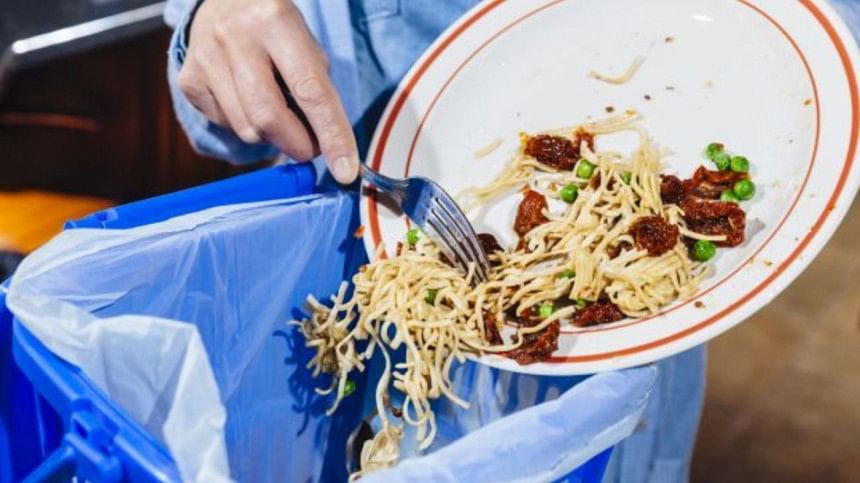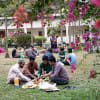Why you should not waste food during Ramadan

Growing up, we were taught that wasting food was a sin. Every bite of food was valued in our culture, so we always heard our elders say that not even a grain of rice should go to waste. However, various factors have changed the way we once thought and behaved, resulting in a Bangladeshi society where a large number of people struggle to make ends meet while some citizens have access to more food than they can consume.
According to Food and Agriculture Organization (FAO), in 2022, as many as 828 million people in the world did not know where their next meal would come from. This figure is expected to be greater in 2023. Wasting food is therefore the last thing we should do in these grim times. Ramadan, the month to practice self-control, self-discipline, and empathy for the less fortunate could be the perfect occasion to start minimising food waste.
Take only what you can eat
Many of us were taught to leave the table only after we have finished the last bite of our food. We have forgotten that childhood lesson with time. Today, some of us pile our plates high and do not care to finish the food. However, wasting something as valuable as food is wrong in every way.
If you want to avoid wasting food next time, take only what you can eat, not more. If you will be attending an iftar or sehri get-together this Ramadan, bear this simple tip in mind to avoid wasting food. More than often, we assume ourselves to be hungrier than we are, especially during iftar time, which results in putting more food than we can eat on our plates.
Donate surplus food
If you are the owner of a restaurant that will be selling iftar or sehri this Ramadan, donate the leftovers in your kitchen before they go bad. You can also ask a food rescue group or organisation, the local mosque, or an orphanage if they would like to accept your restaurant leftovers. You can also distribute the leftover food among the destitute in the area your restaurant is located.
On an individual level, if you have more food at home than you, your family, and household assistants can eat, share the leftovers with the less fortunate instead of stashing them in the refrigerator. A lot of times, food stashed in the fridge goes unnoticed and becomes inedible. Therefore, to avoid binning perfectly edible food, share it with others.
When I was a child, I used to see my mother pack every day's leftover iftar and give it to my father when he left for his Taraweeh prayer. He always met someone, who would be grateful for that food, on his way to the mosque.
One important thing to bear in mind, share ONLY what you can eat in the first place.
If you will be the host…
We think that instead of hosting a lavish iftar or sehri get-together this Ramadan, you can spend the money in more meaningful ways. Perhaps you can choose to feed the underfed instead; you can host iftar for those who are less fortunate than you. You can also donate to charity organisations, which serve free iftar and sehri to the underprivileged.
However, if hosting an iftar or sehri get-together is important to you, do so, but say NO to extremes and excesses. If you have leftovers, share them with those who have less than you.
Food waste leads to price increases
At the time of writing this piece, food prices are at an all-time high. While supply shortages and increased costs of production and transportation directly hike up food prices, food waste indirectly hikes up the prices of food.
Some of us can afford to buy more food than we can eat or need but because food is a perishable item, you cannot store it for an indefinite period of time. Therefore, when we purchase more food than needed, we are wasting it and, in the process, further hiking up the already-high food prices, reducing the number of people who can afford the food they need.
Ramadan is about self-control and self-discipline. It is about showing empathy toward others. Let these teachings of Ramadan guide us all through the year; let's purchase only what we need and cut back on food waste at every opportunity.
Environmental impact of food waste
Have you ever wondered what happens to the food that we bin? Wasted food ends up in landfills, which contributes to the production of greenhouse gases like methane. In a country like Bangladesh, which is already facing a climate crisis, this is one more reason not to waste food.
Remember, every food product has to make a long journey before it finally reaches the consumer. When we waste food, we also waste all the water, energy, and human effort that was needed to produce, transport, and package it.
As a child, I was taught not to waste a single bite of food. The elders in your family also perhaps taught you the same thing. The holy month of Ramadan could be an ideal occasion to start living up to that valuable lesson we were taught as children; let's not waste food, not even a grain of rice.

 For all latest news, follow The Daily Star's Google News channel.
For all latest news, follow The Daily Star's Google News channel. 







Comments